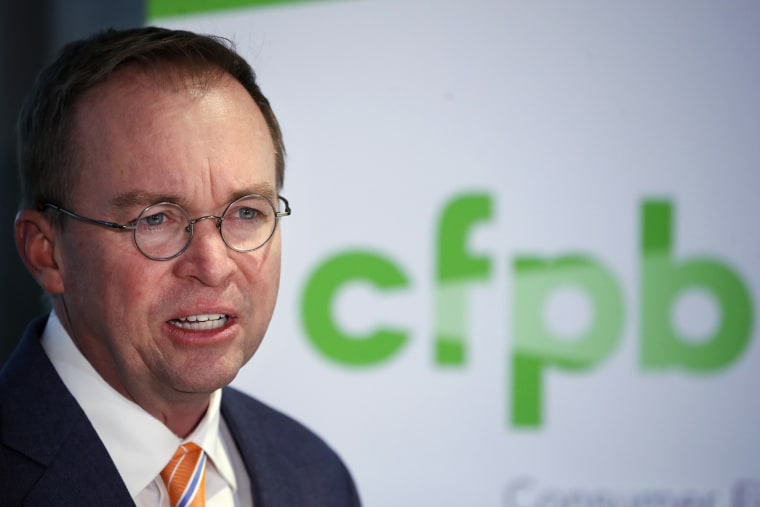Republicans have spent much of the last decade trying to undermine the Consumer Financial Protection Bureau, and with Donald Trump in office, the party is succeeding. As regular readers know, the CFPB's mission has effectively been turned on its head, and as the Washington Post reported last week, enforcement actions against abusive corporations "have dropped by about 75% despite rising number of consumer complaints."
In August, Seth Frotman, the top government official overseeing the $1.5 trillion student loan market, announced his resignation in a rather brutal letter to Mick Mulvaney, Trump's budget director who also controls the CFPB, despite (because of?) his belief that the agency shouldn't exist.
Towards the bottom of the letter, Frotman alleged that the CFPB had uncovered evidence "showing that the nation's largest banks were ripping off students on campuses across the country by saddling them with legally dubious account fees." Frotman added that the agency's current leaders, appointed by Trump, "suppressed" the publication of a report on the findings.
What was that all about? Politico has the story:
The Trump administration for months concealed a report that showed Wells Fargo charged college students fees that were on average several times higher than some of its competitors. [...]The previously unseen analysis examined the fees associated with debit cards and other financial products provided by 14 companies through agreements with more than 500 colleges across the country.Wells Fargo provided roughly one-quarter of those accounts but the bank collected more than half of all fees paid by students, according to the report data. The bank's average annual fee per account was nearly $50, the highest of any provider.
The issue apparently extends well beyond Wells Fargo: the CFPB report documented a series of dubious fees a variety of financial institutions have charged college students, despite regulations intended to prevent the practice.
This would ordinarily be the sort of thing the CFPB would take steps to address. Indeed, it's one of the reasons Democrats created the agency in the first place. Mulvaney's CFPB, however, decided not to even disclose the findings to the public. (It was recently released to Politico in response to a Freedom of Information Act request.)
Making matters slightly worse, there's no reason to believe the direction of the agency will improve anytime soon. The Washington Post reported last week:
The Senate on Thursday confirmed President Trump's nominee to lead the Consumer Financial Protection Bureau, ushering in business-friendly leadership for a polarizing watchdog agency long detested by Republicans and the banking industry.The chamber voted 50 to 49, along party lines, in favor of Kathy Kraninger's nomination.Kraninger will replace the bureau's acting director, Mick Mulvaney, who is also the White House budget chief and Kraninger's current boss. Her nomination took much of Washington by surprise. Kraninger, the associate director of general government at the Office of Management and Budget, has no experience in consumer finance but now will become one of the country's most powerful banking regulators.
A recent USA Today editorial noted, "[T]he public should be able to demand, at a minimum, that the leaders of powerful regulators charged with vital government functions have a passing acquaintance with the industry that is their agency's focus. Kathy Kraninger doesn't meet even such a low standard. That is reason enough for the Senate to reject her."
Fifty Senate Republicans disagreed.
